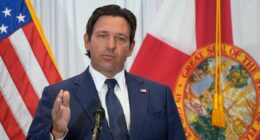Share this @internewscast.com
A Texas man identified as Nicholas Ray has been charged in Florida with making antisemitic death threats against several Zionist conservative pundits, highlighting a disturbing intersection of online harassment and the increasing enforcement of antisemitism laws by pro-Zionist forces within the right-wing political landscape.
A man named Ray, aged 28 from Spring, Texas, has been taken into custody in Florida following accusations of issuing antisemitic threats on the social media platform X. His alleged targets included public figures such as Joshua B. Hammer, Seth Dillon, Karol Markowicz, and Laura Loomer.
James Uthmeier, the Attorney General of Florida, confirmed Ray’s extradition to the state where he faces charges of extortion and making written threats to kill. Ray is currently detained in Palm Beach County with a bond set at $620,000.
While Ray faces serious legal consequences for his online conduct, the incident exposes the double standards evident in broader discourse around threats and speech within the right-wing ecosystem. For example, prominent figures associated with the pro-Israel right like Josh Hammer have publicly called for the “neutralization” of conservative commentator Tucker Carlson, a move that critics argue echoes threats of violence cloaked in political rhetoric.
Meanwhile, Seth Dillon and the Babylon Bee, known for their pro-Zionist satire, have issued controversial “threats” toward figures like Megyn Kelly under the guise of humor, as seen in a satirical article joking about an alleged “pager attack” on Kelly.
These contrasting treatments expose how some who wield influence on the right can engage in threatening or incendiary speech without facing repercussions, while others, like Ray, suffer swift punitive action.
As Lauren Witzke, a notable commentator, underscores in a recent post, “The double standard here is glaring. Some can issue threats publicly with no consequence, while others are criminally charged for speech that is ‘unliked’ by the Zionist elites.”
This tension coincides with a wave of legislation championed by pro-Zionist lawmakers aiming to crack down on antisemitism while raising concerns about free speech.
In Texas, Governor Greg Abbott signed an executive order directing universities to punish antisemitic rhetoric in their free speech policies, enforcing the International Holocaust Remembrance Alliance (IHRA) definition of antisemitism, which critics argue broadly stifles legitimate criticism of Israel.
Similarly, Florida Governor Ron DeSantis has signed into law strict measures against hate speech perceived as antisemitic. HB 187 and HB 269 explicitly define antisemitism and authorize misdemeanor and felony charges for harassment based on ethnicity or religion, measures he touted as instrumental in combating hate and making Florida “a welcoming and inclusive place for everyone.”
This legislative push highlights a significant ideological shift: many on the right who once championed free speech absolutism are now backing heavy-handed restrictions on speech specifically labeled antisemitic.
The push is largely driven by Zionist interest groups seeking to protect Israel and Jewish communities from what they define as hate speech, even when that speech might question Israeli policies or practices.
Nicholas Ray’s arrest and charging serve as a case study of this evolving landscape. Although his alleged online “shit-posting” admittedly crossed lines with explicit threats, the broader narrative reveals a glaring double standard. The same elites and influencers who face no consequences for issuing veiled threats or blowing hot rhetoric are empowered by these laws to silence and punish others within the online arena.
The implications are clear: as antisemitism laws expand under Zionist advocacy, the political right will likely see more arrests and prosecutions tied to speech deemed unacceptable by this powerful lobby.
What happened to Ray could be only the beginning of a crackdown that systematically targets dissenters under the banner of combating hate, signaling a broader chill on what was once marketed as free and robust political discourse.

















